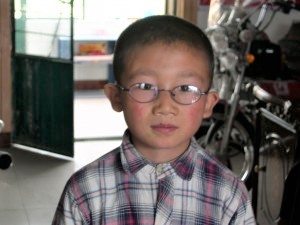Enhancing Education and Productivity by Addressing Myopia Among Rural School Children in China


Summary of Impact
Research by Prof Albert Park, a specialist in development and labor economics, identified the benefits to children of remedial action to address myopia. He did this by rigorously evaluating for the first time the impact of fitting children with eyeglasses on their educational outcomes. He and his collaborators found significant improvements in children's test scores, indicating that the provision of eyeglasses could be a highly effective way to spend scarce resources. The findings and follow-up studies led to policy reforms at provincial and national levels in China, benefiting millions of children, and the establishment of a social enterprise that has equipped more than 100,000 rural children in China with eyeglasses, assisting their vision, health and educational attainment, and in turn enhancing their future productivity. The research has inspired similar studies elsewhere and increased global awareness of the problem of untreated myopia in children.
Underpinning Research
About 10% of primary school students in developing countries have poor vision, but very few of them wear glasses, including an estimated 17 million children in China alone. However, the consequences for children and communities had been underexplored in research, partly due to the fact that statistical correlations between visual acuity and test scores do not capture the impact of vision on learning when the very process of studying harder may adversely affect one's vision. Park and his co-authors addressed this by conducting the first ever randomized trial to provide free eyeglasses to children in order to assess the impact of poor vision on academic performance [R1].
The intervention was supervised directly by Prof Park and carried out during the 2004-05 academic year in two rural counties in Gansu Province in Western China, in collaboration with the Gansu Center for Disease Control (CDC) and funded by the World Bank. Prof Park, a well-known expert on China's economic development, was directing a longitudinal study of youth in Gansu [R2], working with Gansu CDC, which had identified myopia as a health problem facing local rural youth. That work prompted the idea of conducting the intervention study, which was enthusiastically supported by the World Bank research department as an example of an innovative, low-cost intervention to improve learning in developing countries.
While a working paper presenting the findings was completed in 2009, Prof Park led further analysis of the data after joining HKUST in 2011, leading to its academic publication in 2016 [R1].
In total, 256 primary schools in 37 townships participated in the study. In each county, townships were divided into pairs sorted by per capita income and from each pair one township was randomly selected for the intervention. Baseline and follow-up data were collected for all primary school students entering grades 4-6 in both the intervention and control townships. In treated townships, all students entering grades 4-6 were given a vision test and those with poor vision were offered free eyeglasses that were delivered near the beginning of the school year. The main sample used for analysis included nearly 19,000 students, of which 13.4% had poor vision but only 2.3% had eyeglasses prior to the project.
The study's main finding was that wearing eyeglasses for one academic year increases average Chinese and mathematics test scores of students with poor vision by 0.16 to 0.22 standard deviation, equivalent to 0.33 to 0.50 additional years of schooling. In other words, wearing eyeglasses increased the amount of learning over the school year from between 33 and 50 per cent.
The study also found that the benefits were greater for those with lower initial test scores; thus widespread eyeglass adoption is likely to generate more equitable outcomes in education. Prof Park and co-authors conducted a cost-benefit analysis, which suggested very high economic returns to wearing eyeglasses. The project provided high-quality glasses that cost only RMB120 (about US$15) and, using data from rural Gansu Province, estimated the returns from one year of education wearing eyeglasses, even using the team's lower bound estimate, would raise an individual's yearly income by RMB128, more than the cost of the eyeglasses. This raised the question: why don't families invest in eyeglasses themselves if the returns are so high? Even in this study, which offered eyeglasses for free, 30 per cent of students with poor vision refused them. Prof Park found that girls were more likely to refuse the free eyeglasses, perhaps due to greater concerns about their appearance, and that parental lack of awareness of vision problems, mothers' education, and economic factors (household expenditures per capita and price) significantly affected whether children wore eyeglasses in the absence of the intervention.
In another study published in 2017 that analyzed the longitudinal study of children in Gansu, Prof Park and co-authors showed that poor cognitive skill development as reflected in low primary school test scores was an important predictor of whether children remained in school or entered the workforce after they completed compulsory schooling (primary and middle school) [R2]. This provides further evidence of the importance of addressing myopia that had been found to be holding Gansu children back in their skills development [R1].
Details of the Impact
Research by Prof Park and his co-authors was the first to convincingly demonstrate the impact of poor vision on academic performance and highlight the potential benefits to children of wearing eyeglasses. Given the high prevalence of myopia across the world, the large percentage of children with myopia who do not wear eyeglasses, and the relatively low cost of providing spectacles relative to the benefits, the research findings suggest intervention could be a highly effective way of using scare financial resources.
This important finding began to attract attention in 2011, when the working paper from the trial was presented in January of that year at the annual meeting of the American Economic Association. Soon after, it was featured on the popular American radio show and podcast Freakonomics broadcast in April 2011, with excerpts also broadcast on National Public Radio (NPR). Later, the study was described by "rogue economists" Steven Levitt and Stephen Dubner, authors of Think Like A Freak (2014), as a eureka moment in their "8 winning ways to think like a freak".
The high visibility of the research led to it being noticed by Dr Scott Rozelle, founder and Director of Stanford's Rural Education Action Program (REAP), an organization dedicated to conducting research and evaluation on interventions with high potential to improve children's health and education outcomes in rural China in order to influence policy. In his support letter, Dr Rozelle wrote: "I can state unequivocally that Professor Park's eyeglass intervention study … in two counties in Gansu Province in northwest China is what first made REAP aware of the myopia problem in China … the study … demonstrated a clear need among children in exactly the areas that REAP has been targeting its assistance.” He continued: “Awareness of this health issue due to their study is what led REAP to initiate a series of research projects to confirm their findings and test the efficacy of different policy interventions designed to encourage students to wear eyeglasses.” REAP studies, which began in 2012 and were first published in 2014, found that: wearing glasses does not make vision worse (a common belief) but is actually protective against worsening myopia; frequently recommended eye exercises do not improve vision; subsidies are critical for getting families to purchase eyeglasses; and teachers play a vital role in encouraging students to wear eyeglasses and can be effective screeners for identifying vision problems. Dr Rozelle also affirmed REAP's influence on government policy. Through its partners in the Chinese Academy of Sciences, in 2013 a policy memo on China's myopia problem describing their research was delivered to China's State Council, where its value was recognized by State Council leaders and disseminated through the Office of the State Council and the Office of the Central Committee of the Communist Party. REAP also communicated their results to Education Bureau officials in the two provinces where many of the studies were conducted (Shaanxi and Gansu). In 2014 and 2017, the Education Bureaus of both provinces issued circulars on how to strengthen the prevention and control of myopia, including correcting vision by fitting eyeglasses. This was the first time the Shaanxi provincial government had recognized the high prevalence of uncorrected myopia and that glasses are the safest and most effective way to treat the problem among children. Subsequently, in 2018, China's Ministry of Education, National Health Commission, and six other ministries jointly issued guidelines on comprehensive measures to address China's significant myopia problem, including monitoring the production, distribution, and sales of high-quality eyeglasses; disseminating information on myopia; encouraging children to spend more time outdoors exercising; limiting time spent playing electronic games and on the internet; establishing stations with trained staff to lead local efforts to combat myopia; and establishing a measurement system to monitor progress and increase accountability.
REAP also directly addressed the vision needs of China's rural children, originally identified by Prof Park's research, by launching the social enterprise Smart Focus in 2015 to provide greater access to affordable eyeglasses for children in poor areas. Smart Focus has partnered with the world's largest eyeglass manufacturer Luxottica OneSight, which pledged to provide US$3 million in eyeglasses through to 2020, and opened four county-level Vision Centers that together treat over 1,000 people per month. By September 2018, Smart Focus had distributed 100,000 eyeglasses and launched plans to expand its centers in three northwest provinces and reach 200,000 eyeglasses issued by 2020. Dr Rozelle wrote: “It is safe to say that Professor Park's study was a key catalyst for all of REAP's vision-related activities, which I am proud to say is positively affecting the lives of hundreds of thousands of rural children in China.”
In recent years, Prof Park's findings have been presented in a number of academic and policy reviews of health and education interventions in other developing countries, making it a visible policy option for government and NGO leaders considering different interventions to promote learning and economic development (see, for example, the Handbook of the Economics of Education, Volume 5 and a report by the Swedish government's Expert Group for Aid Studies). It has also generated interest from NGOs in other countries, such as Florida Vision Quest and Vision for a Nation Foundation, which has led to similar intervention-based studies in the US, Rwanda, Malawi, and Vietnam, which in turn have the potential to inform policy responses in those countries.
References to the Research
[R1] Glewwe, Paul, Albert Park, and Meng Zhao, “A Better Vision for Development: Eyeglasses and Academic Performance in Rural Primary Schools in China,” Journal of Development Economics 122: 170-182, 2016. [82 Google citations to published and working paper versions]
[R2] Glewwe, Paul, Qiuqiong Huang, and Albert Park. "Cognitive Skills, Noncognitive Skills, and School-to-Work Transitions in Rural China", Journal of Economic Behavior and Organizations 134: 141-164, 2017. [38 Google citations to published and working paper versions]